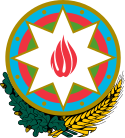 |
|---|
|
|
After its independence from the Soviet Union, elections in Azerbaijan have frequently been affected by electoral fraud and other unfair election practices, such as holding opposition politicians as political prisoners. Since 1993, Heydar Aliyev and his son Ilham Aliyev have been continuously in power.[1][2][3][4][5][6][7]
Political scientists characterize Azerbaijan as an electoral authoritarian regime.[8] The ruling New Azerbaijan Party, headed by Ilham Aliyev, controls all the electoral commissions in Azerbaijan.[9]
The President of Azerbaijan is elected for a seven-year term by the people; before a constitutional referendum changed this in 2009, the position was limited to two terms. The National Assembly (Milli Məclis) has 125 members. Before 2005, 100 members were elected for a five-year term in single-seat constituencies and 25 members were elected by proportional representation. Since 2005 all 125 members are elected in single-seat constituencies. Azerbaijan is a one party dominant state. The most recent parliamentary elections were held on Sunday, 1 September 2024. The most recent presidential election was held on Wednesday, 7 February 2024.
- ^ Umudov, Agshin (2019). "Europeanization of Azerbaijan: Assessment of Normative Principles and Pragmatic Cooperation". Politik und Gesellschaft im Kaukasus: Eine unruhige Region zwischen Tradition und Transformation (in German). Springer Fachmedien. pp. 67–68. ISBN 978-3-658-26374-4.
- ^ Goyushov, Altay; Huseynli, Ilkin (2019). "Halted Democracy: Government Hijacking of the New Opposition in Azerbaijan". Politik und Gesellschaft im Kaukasus: Eine unruhige Region zwischen Tradition und Transformation (in German). Springer Fachmedien. pp. 27–51. doi:10.1007/978-3-658-26374-4_2. ISBN 978-3-658-26374-4.
- ^ Bedford, Sofie; Vinatier, Laurent (October 2019). "Resisting the Irresistible: 'Failed Opposition' in Azerbaijan and Belarus Revisited". Government and Opposition. 54 (4): 686–714. doi:10.1017/gov.2017.33. ISSN 0017-257X.
- ^ Kamilsoy, Najmin (1 September 2023). "Unintended transformation? Organizational responses to regulative crackdown on civil society in Azerbaijan". Southeast European and Black Sea Studies: 1–20. doi:10.1080/14683857.2023.2243698.
- ^ Bajek, Mateusz (2020). "The meaning behind Azerbaijan's forged elections". New Eastern Europe. pp. 107–113. Retrieved 6 September 2023.
- ^ Synovitz, Ron (7 February 2020). "Azerbaijan's 'Equal Coverage' Law Stifles Media Reports on Elections". Radio Free Europe/Radio Liberty. Retrieved 6 September 2023.
- ^ Kramer, Richard Kauzlarich, David J. (11 April 2018). "Azerbaijan's Election Is a Farce". Foreign Policy. Retrieved 6 September 2023.
{{cite news}}: CS1 maint: multiple names: authors list (link) - ^ Sarkissian, Ani (2015). The Varieties of Religious Repression: Why Governments Restrict Religion. Oxford University Press. p. 80. ISBN 978-0-19-934808-4.
- ^ "Azerbaijan Parliamentary Elections 2005: Summary". www.hrw.org. 2005.